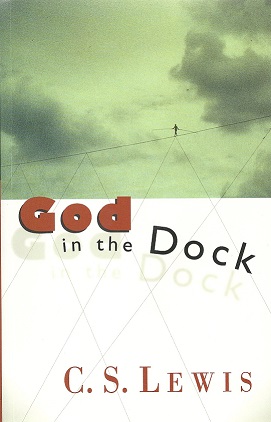Book Description
Lewis struck me as the most thoroughly converted man I ever met, observes Walter Hooper in the preface to this collection of essays by C. S. Lewis. “His whole vision of life was such that the natural and the supernatural seemed inseparably combined.”
From the Back Cover
The work of C. S. Lewis has become synonymous with modern Christian apologetics. Dubbed the “apostle to skeptics,” Lewis was a profound thinker with the rare ability to communicate the truths of the Christian faith in simple yet amazingly effective ways. Insightful, engaging, and often full of wit, his books are models of genuine Christianity expressed in brilliant contemporary prose.
God in the Dock contains forty-eight essays and twelve letters written by Lewis between 1940 and 1963. Ranging from popular newspaper pieces to learned defenses of the faith, these essays cover topics as varied as the logic of theism, good and evil, miracles, the role of women in the church, and ethics and politics. Many represent Lewis’s first ventures into themes he would later treat in full-length books.
From Chapter Two: Miracles
I have known only one person in my life who claimed to have seen a ghost. It was a woman; and the interesting thing is that she disbelieved in the immortality of the soul before seeing the ghost and still disbelieves after having seen it. She thinks it was a hallucination. In other words, seeing is not believing. This is the first thing to get clear in talking about miracles. . . .
From Chapter Eight: The Laws of Nature
The laws of physics, I understand, decree that when one billiards ball (A) sets another billiards ball (B) in motion, the momentum lost by A exactly equals the momentum gained by B. This is a Law. That is, this is the pattern to which the movement of the two billiards balls must conform. Provided, of course, that something sets ball A in motion. And here comes the snag. The law won’t set it in motion. It is usually a man with a cue who does that. But a man with a cue would send us back to free-will, so let us assume that it was lying on a table in a liner and that what set it in motion was a lurch of the ship. In that case it was not the law which produced the movement; it was a wave. And that wave, though it certainly moved according to the laws of physics, was not moved by them. It was shoved by other waves, and by winds, and so forth. And however far you traced the story back you would never find the laws of Nature causing anything.

God in the Dock
.
How much better to simply reason on the subject at hand! How unfortunate that it has become so popular to ridicule ones opponent, to portray somebody as a fool, rather than to discuss the subject!
The Boy Who Harnessed the Wind
An inquisitive boy lives in a poor village in the middle of a poor region of Africa, yet has the courage to turn away from ridicule and keep working, failing, and eventually succeeding, to construct a fully-functioning wind-driven electric generator.


